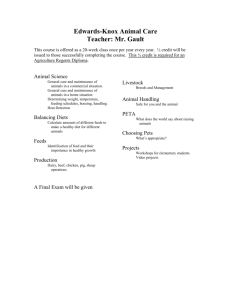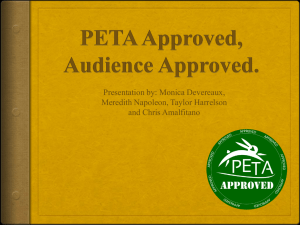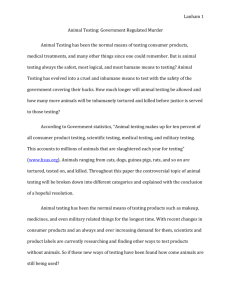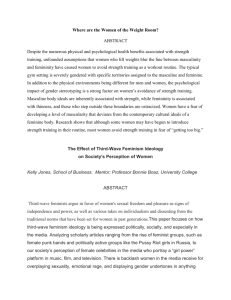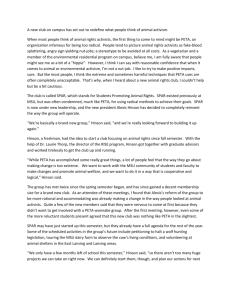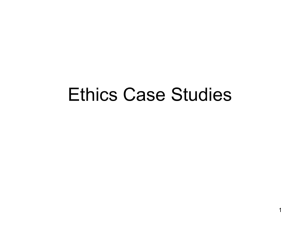PETA`s `Save the Whales` Ad: Offensive and Effective
advertisement
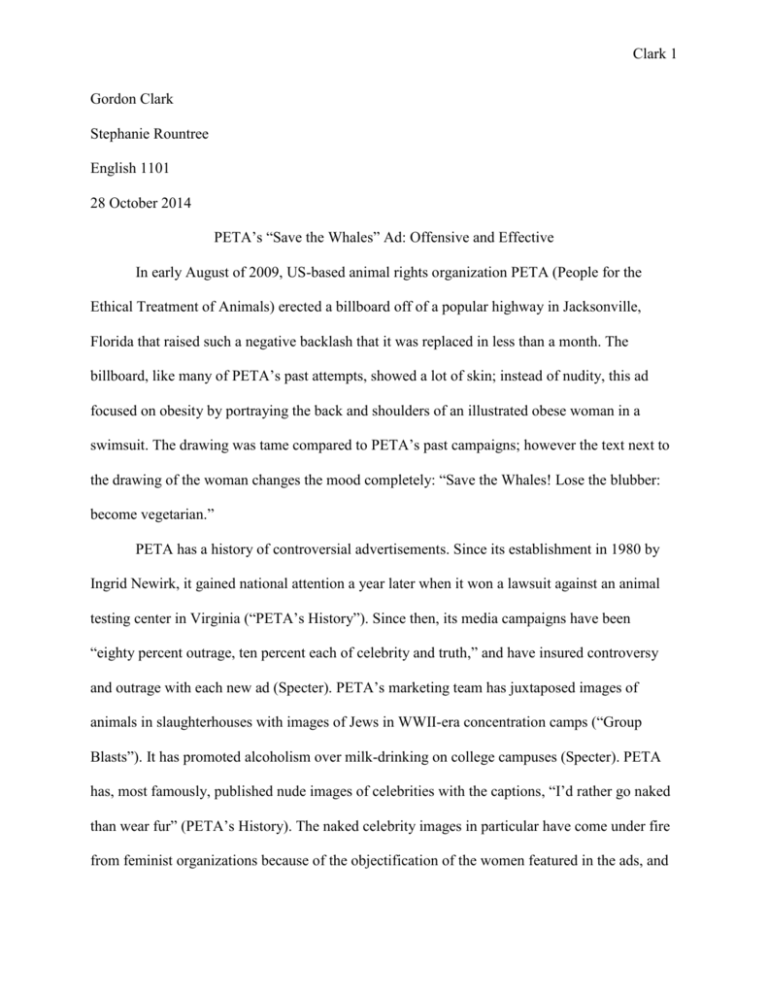
Clark 1 Gordon Clark Stephanie Rountree English 1101 28 October 2014 PETA’s “Save the Whales” Ad: Offensive and Effective In early August of 2009, US-based animal rights organization PETA (People for the Ethical Treatment of Animals) erected a billboard off of a popular highway in Jacksonville, Florida that raised such a negative backlash that it was replaced in less than a month. The billboard, like many of PETA’s past attempts, showed a lot of skin; instead of nudity, this ad focused on obesity by portraying the back and shoulders of an illustrated obese woman in a swimsuit. The drawing was tame compared to PETA’s past campaigns; however the text next to the drawing of the woman changes the mood completely: “Save the Whales! Lose the blubber: become vegetarian.” PETA has a history of controversial advertisements. Since its establishment in 1980 by Ingrid Newirk, it gained national attention a year later when it won a lawsuit against an animal testing center in Virginia (“PETA’s History”). Since then, its media campaigns have been “eighty percent outrage, ten percent each of celebrity and truth,” and have insured controversy and outrage with each new ad (Specter). PETA’s marketing team has juxtaposed images of animals in slaughterhouses with images of Jews in WWII-era concentration camps (“Group Blasts”). It has promoted alcoholism over milk-drinking on college campuses (Specter). PETA has, most famously, published nude images of celebrities with the captions, “I’d rather go naked than wear fur” (PETA’s History). The naked celebrity images in particular have come under fire from feminist organizations because of the objectification of the women featured in the ads, and Clark 2 the use of their bodies to promote an unrelated cause (Specter). Newkirk, PETA’s founder, revels in the media attention, good or bad, and has stated that “We would be worthless if we were just polite and didn’t make any waves” (Specter). The “Save the Whales” campaign was launched late into the summer beach season in Jacksonville, Florida. According to Newkirk, “America’s obesity epidemic calls for tough love,” and this billboard is certainly tough on obese Americans (Goldstein). PETA, however, has just the remedy for getting rid of one’s excess weight: vegetarianism. They have it written plainly underneath the main text of the billboard: “lose the blubber: go vegetarian.” On PETA’s web page promoting the launch of the campaign, it accurately states that vegetarians are “20 to 30 percent leaner than meat-eaters” (Graffeo). The billboard targets the middle-class residents of Jacksonville who have a high percentage of overweight citizens; people with low incomes are likely unable to take vacations to Jacksonville Beach during the summer beach-going season. Middle class people also have more choices when it comes to diet because they are not required by their budgets to walk past the organic fruit and vegetable displays in the grocery stores. The argument that the billboard makes is quite logical. People on a vegetarian diet are less likely to develop heart disease, breast cancer, diabetes, and other diseases related to obesity (“Being Vegetarian”). Vegetarian and vegan diets are often low in fat and high in fiber and whole grains, which further decrease the risk of obesity. Becoming vegetarian to lose weight is something that PETA touts in numerous places on its website because it makes sense that cutting out meat, which can be high in fats and cholesterol, can result in weight loss. What they do not consider are people with genetic conditions that make it incredibly difficult to maintain a healthy weight, even with a vegetarian or vegan diet. The ethos PETA has is utilized by putting its logo in the lower right-hand corner. Clark 3 Depending who you ask, however, putting its name on something can either be a significant boost or a kiss of death because PETA’s advertizing strategy has proven polarizing to the public. After PETA supporters have thrown red paint on the furs of models at high-end fashion shows, audience members are screened even with even more scrutiny than before; PETA specifically does not sponsor any bills in government because even the rumor of their support will elicit an opposing majority no matter how good its intentions are (Specter). However, PETA still pulls in millions of dollars in donations from millions of supporters worldwide each year, so the organization must be speaking effectively to some demographic (“Our History”). It is debatable though if that supporting demographic would support the visual and textual rhetoric this particular billboard in Jacksonville, FL. PETA’s advertisements and marketing campaigns historically use shock tactics to fuel pathetic arguments, and this billboard is no exception: it appeals to one’s sense of guilt. They aim to take that guilt that people feel each time they step on the scale and see a number too high and apply it towards vegetarianism. By using words like “Whale” and “Blubber” PETA aims to make the audience feel guilty and ashamed about their weight. The second set of text, “lose the blubber: become vegetarian,” implies that a better person is not only healthier (and consequently has no blubber) but does not eat meat either. For people insecure about their weight and body image, this argument can be extremely effective. While offensive, the argument is valid: a diet that cuts out the fats and cholesterol found in meat can help people lose weight. However, PETA subverts that argument by using its logo in the ad and by using offensive language. Because of its history, many people disregard and ignore PETA no matter what subject they are rallying for or against. If PETA wanted to avoid this ethos issue, it could have simply provided a website link (that was not peta.com) or made a different Clark 4 logo that is not obviously associated with PETA. The offensive language could have also been avoided. An ad hominem attack – calling your target audience whales – is not only an invalid argument, but it also puts your audience on defense and makes them less open to your message regardless of its truthfulness. For all we know, some of the “whales” the ad speaks of could be nutritionists, or people suffering from a medical condition that are on strict, prescribed diets. A better billboard could have said something along the lines of: “Thinking of losing weight? Vegetables can help!” Because PETA’s billboard does not use gentle language, its logical argument is much more likely to get lost in a sea of hurt feelings and communicate unintended messages. When overweight or obese people see the ad, they probably feel embarrassed and ashamed to the extend they will not consider vegetarianism, but instead mull over their shame at their weight and their anger at PETA for making them feel this way (Goldstein). Suddenly the argument transforms from one between a meat-eating and a vegetarian diet into an argument about the morality around putting up a billboard with offensive language on the side of a popular highway (Goldstein). The lash-backs and debates about the morality surrounding the billboard caused PETA to enact a “billboard swap” where they replaced the “Save the Whales” ad with a far less offensive version. In an interview with Michael Specter, Ingrid Newkirk said that PETA’s goal was to protect animals and ensure their ethical treatment, not to gain supporters (Specter). With this mission statement, every ad that brings its websites views or generates a news article is a successful one. In that same interview, Newkirk claims that a vegetarian will not become a meateater merely because of a PETA ad that offends them—a vegetarian may criticize and speak against PETA, but they will continue to eschew meat. So if the “Save the Whales” ad would not Clark 5 be turning away current vegetarians, the only place to go would be up. Newkirk’s relentless pursuit to help animals through means of embarrassment, shaming, and downright name-calling have made her one of the most controversial women in America, but it has also advanced the cause of animal rights at an astounding pace. People are generally more inclined to reach a middle ground, and extremist groups like PETA make moderate groups like the SPCA look more reasonable and mainstream. PETA’s “Save the Whales” billboard is not ethical, gentle, or kind, but in the schema of advancing animal rights, it is effective. Clark 6 Works Cited Bandi, Brittany. “New PETA Vegetarian Anti-Obesity Campaign Asks Us to ‘Save the Whales’.” CalorieLab. CalorieLab, inc. 10 Aug. 2009. Web. 23 Oct. 2014. “Being a Vegetarian.” Brown. Brown University. N.d. Web. 25 Oct. 2014. Goldstein, Katherine. “PETA's New "Save The Whales" Billboard Takes Aim At Fat Women (UPDATED).” Huffington Post. Huffington Post. 26 Sep. 2009. Web. 21 Oct. 2014. Graffeo, Liz. “Lose the Blubber: Go Vegetarian.” PETA. People for the Ethical Treatment of Animals. 17 Aug. 2009. Web. 21 Oct. 2014. “Group Blasts PETA ‘Holocaust’ Project”. CNN. Cable News Network. 28 Feb. 2003. Web. 25 Oct. 2014. Mullins, Alisa. “Controversial ‘Save the Whales’ Billboard Swap.” PETA. People for the Ethical Treatment of Animals. 24 Aug. 2009. Web. 23 Oct. 2014. “PETA’s History: Compassion in Action.” PETA. People for the Ethical Treatment of Animals. N.d. Web. 23 Oct. 2014. Specter, Michael. “The Extremist: The Women behind the most Radical Group in America.” The New Yorker 4 Apr. 2003. Web 23 Oct. 2014.
